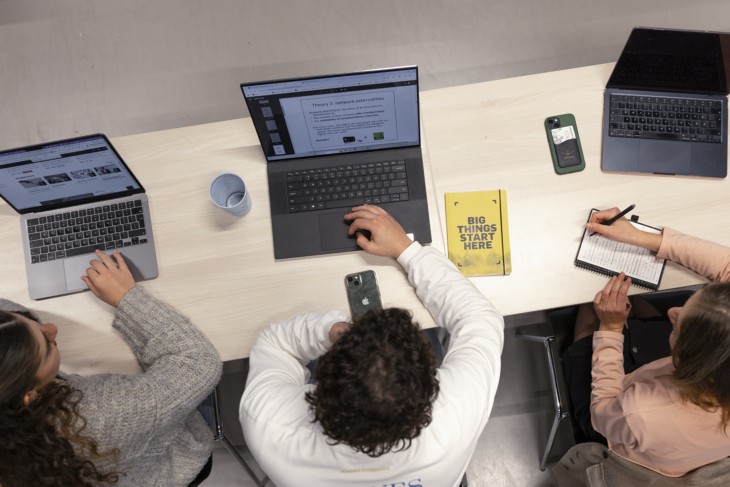1. The Ghost
Ah yes, the one who’s bound to be present in almost every group you’re in: The Ghost. Legends say that this person exists only on Canvas – they don’t show up to classes, nor working sessions, nor meetings. They don’t show up to anything, really, and that’s why we call them ‘The Ghost’. Sometimes you’re left wondering how that person is still in the study programme to begin with.
Usually, you and your other (present, non-ghost) groupmates sort of realise what’s going on, and you just square your shoulders and take the burden with one less person present. Most of the time, the project doesn’t end too badly, and you’ll scrape by with a decent grade. However, if things do end up going south, I’d suggest saving everything that’s been written (preferably over text or email) so you have proof you can show if someone comes asking for it. If they show up during the last days of the project and decide that they want to help, give them the smallest of tasks and let them sort it out themselves. Report everything to your project tutor or manager if they’re giving you trouble, and make sure you have everything – transcripts, editing history, etc. – kept in your records.
2. The Confused One
A bit of a rarer sight, especially in your later years, but they still exist nonetheless: The Confused One. I dub them this because they’re not necessarily unhelpful or unwilling to work, just that they might not be sure where to begin or what the project really is about. Luckily, most people who have been ‘The Confused One’ of the group tend to be quite motivated to help and feel included, so it typically works out in the end.
I’d suggest having them work with you during the project if you’re confident in your own skills and you know what’s going on. You could ask them to be your sane checker: let them be your proofreader, your down-to-earth weight. If you can manage to explain things and teach them a bit along the way, then you’ll understand your own work better, and produce a better project overall.
3. The Procrastinator
Most procrastinators I’ve worked with tend to be quick on their feet, competent, and generally intelligent. The problem is – they’re lazy, and most of the time, you’ll have to find that out the hard way. Whether it’s a part of the report not being done hours before the submission deadline, or an unfinished simulation that should’ve been finished days ago, ‘The Procrastinator’ strikes hard and true. It’s a pain to deal with sometimes.
What do you do if you have a known procrastinator in your group? I’d suggest having working sessions together, as a group – they’re procrastinators, not ghosts (unless they’re both, in which case you’re kind of screwed). If you work together as a team, all of you in one room, then you’re bound to get some work done, right then and there. Otherwise, have them be the presenters and the ones who answer most of the questions afterwards.
4. The Helicopter Parent
The ‘Helicopter Parent’, also called the ‘Control Freak’, is someone who has a huge ‘fear of missing out’. I said it – they’re just insecure about being left out, so they like to know about every single minute detail of the project, down to its most mundane bits – sometimes about their own groupmates’ lives.
Regardless, sometimes you need a control freak in your group. They’re usually organised, detailed, and attentive, and if you ignore their other possible traits (such as being a borderline dictator) you’ll realise that the Helicopter Parent is a valuable asset to the group.
5. The Carry
Sometimes, you’ll find yourself stuck between a rock and a hard place and will have no idea where to go. Other times, your entire group will forget to make slides for a presentation you have in a couple of hours. And on other times, you’ll realise that you didn’t edit your report the night before it was due. Fear not – that’s where ‘The Carry’ comes in.
The Carry isn’t one who is in this role because they want to – they’re filling their position because their group needs them. If duty calls, the Carry must answer: whether it’s shouldering all the group’s responsibilities, pushing their group in the right direction, or carrying out all the necessary edits and tasks and dragging them all across the finish line – the Carry can do it all. Make sure you’re nice to them, and to ease their burden as much as you can. No one likes to be the Carry, but if it so happens to be you, take it as a learning experience.
Groupwork can be frustrating at times, and I’ve finally pinpointed why – you’re basically leaving your grade, your hard work, in the hands of other people. That can be hard to accept, especially if you come from a culture where solitary work is more common, but sometimes, you’ve got to trust in the strength of your groupmates and learn to work together. While it is annoying and damning to depend on possibly-unreliable people, just make sure you’re not any one of these types of group mates. And if you’re a Carry – well, just hope that your team is ready to support you.




